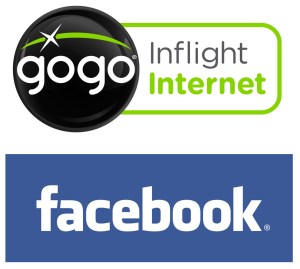 In-flight Wi-Fi provider Gogo and Ford Motor Company are counting on your Facebook addiction to help boost sales numbers. For the month of February, Gogo will provide fliers on Gogo-equipped airplanes with free access to Facebook.
In-flight Wi-Fi provider Gogo and Ford Motor Company are counting on your Facebook addiction to help boost sales numbers. For the month of February, Gogo will provide fliers on Gogo-equipped airplanes with free access to Facebook.
The promotion is a smart one, as Facebook holds the title for most-accessed site on the high-flying Gogo network, which is currently available on nearly 4,000 commercial flights per day, more than 2,200 of which are accessed on Delta airline’s flights alone.
“Facebook continues to be the number one website visited by travelers using Gogo at 30,000 feet,” said Jim Berrien, Chief Revenue Officer of Aircell, which owns the Gogo brand. “Our commitment is to offer great inflight experiences to our users, and unique marketing opportunities to advertisers. We’re thrilled that an innovative marketer like Ford is providing this complimentary service as a way to enhance the traveler experience.”
To access the free Facebook connection, users simply connect to the Gogo network (only after they’ve reached the safe altitude of 10,000 feet, of course), and click on the Gogo/Ford banner. Badda-bing badda-boom, Facebook at no charge.
The Facebook promotion will be available on North American flights for AirTran Airways, Alaska Airlines, American Airlines, Delta Air Lines, United Airlines, US Airways and Virgin America. So if you’re on a tipping point between which airline to fly with, perhaps this free deal could sway the balance.
Those who want to browse more than just their Facebook friends’ latest status updates, however, must cough-up the $5 to $13 connection fee (the shorter the flight, the less connectivity costs), which will give users access to the Internet in all its glory.
The Gogo-Ford-Facebook promotion is only the latest marketing ploy to creep into our tightly-packed aircraft space. During the holiday season, Google teamed up with Gogo to promote its Chrome Web browser.
According to Aircell, around 10 percent of passengers on Wi-Fi enabled flights use the service. Whether or not free Facebook is enough to make those numbers jump up a place or two remains to be seen.


